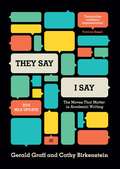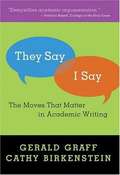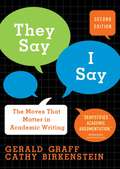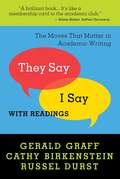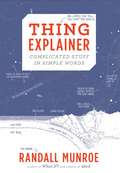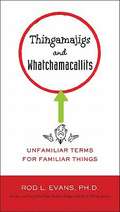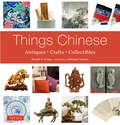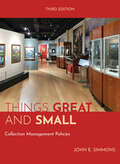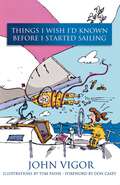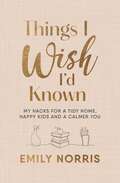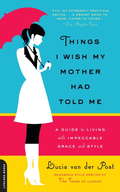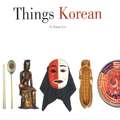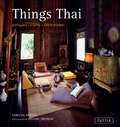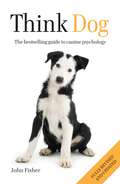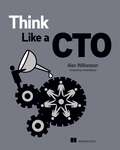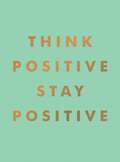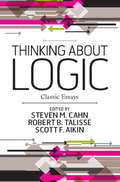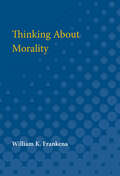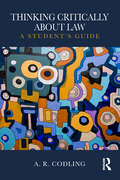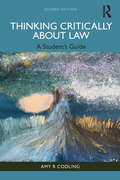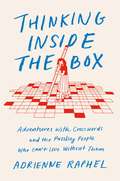- Table View
- List View
They Say / I Say: The Moves That Matter In Academic Writing 3rd Edition
by Gerald Graff Cathy Birkenstein"They Say / I Say" identifies the key rhetorical moves in academic writing, showing students how to frame their arguments in the larger context of what others have said and providing templates to help them make those moves. And, because these moves are central across all disciplines, the book includes chapters on writing in the sciences, writing in the social sciences, and--new to this edition--writing about literature.
They Say / I Say: The Moves That Matter in Academic Writing
by Gerald Graff Cathy Birkenstein"They Say / I Say" shows that writing well means mastering some key rhetorical moves, the most important of which involves summarizing what others have said ("they say") to set up one's own argument ("I say"). In addition to explaining the basic moves, this book provides writing templates that show students explicitly how to make these moves in their own writing.
They Say / I Say: The Moves That Matter in Academic Writing (2nd edition)
by Gerald Graff Cathy BirkensteinThey Say / I Say has essentially defined academic writing, identifying its key rhetorical moves, the most important of which is to summarize what others have said to set up one's own argument.
They Say / I Say: The Moves That Matter in Academic Writing, with Readings
by Russel Durst Gerald Graff Cathy BirkensteinIn addition to explaining the basic moves, this book provides writing templates that show students explicitly how to make these moves in their own writing. Now available in two versions, with and without an anthology of 32 readings.
They Went That-a-way ...
by Malcolm ForbesHow the famous, the infamous, and the great have died. Here are the exits made by 175 people famous sometime during the past 3000 years.
Thing Explainer
by Randall MunroeHave you ever tried to learn more about some incredible thing, only to be frustrated by incomprehensible jargon? Randall Munroe is here to help. In Thing Explainer, he uses line drawings and only the thousand (or, rather, "ten hundred") most common words to provide simple explanations for some of the most interesting stuff there is, including:food-heating radio boxes (microwaves)tall roads (bridges)computer buildings (datacenters)the shared space house (the International Space Station)the other worlds around the sun (the solar system)the big flat rocks we live on (tectonic plates)the pieces everything is made of (the periodic table)planes with turning wings (helicopters)boxes that make clothes smell better (washers and dryers)the bags of stuff inside you (cells) How do these things work? Where do they come from? What would life be like without them? And what would happen if we opened them up, heated them up, cooled them down, pointed them in a different direction, or pressed this button? In Thing Explainer, Munroe gives us the answers to these questions and so many more. Funny, interesting, and always understandable, this book is for anyone--age 5 to 105--who has ever wondered how things work, and why.
Thingamajigs and Whatchamacallits
by Evans Rod L.Have you been guilty of catachresis* at work? Have you defenestrated* your dictionary in frustration? Do you have phloem bundles* stuck in your diastema*? Scratching your occiput* now? Rod L. Evans's Thingamajigs and Whatchamacallits will help take the mystery out of some of our most obscure words. Containing hundreds of words from agitron (the phenomenon of wiggly lines in comic strips indicating that something is shaking) to zarf (the holder for a paper cone coffee cup), this lively reference will enable you to easily locate your thingamajig or whatchamacallit, be it animal, vegetable, mineral, or punctuation mark. Leave no linguistic oddity unexamined-your brain will thank you. *catachresis: strained, paradoxical, or incorrect use of a word; *defenestrate: to throw out a window; *phloem bundles: stringy bits between the skin and the edible parts of a banana; *diastema: the gap between teeth in a jaw; *occiput: the back part of the head or skull .
Things Chinese
by Michael Freeman Ronald G. KnappA source of fascination to the West, China's renowned art objects and traditional manufactured products have long been sought by collectors. Things Chinese presents sixty distinctive items that are typical of Chinese culture and together present a window onto the people, the history and the society of the world's largest nation.Featuring descriptions and full-color photographs, the history, cultural significance and customs surrounding these objects and their importance becomes clear. Items covered include:Bamboo furnitureIvory carvingSnuff BottleMooncake mouldsMusical InstrumentsMahjong setsFengshui compasses
Things Great and Small: Collection Management Policies
by John E. SimmonsCollection care is a fundamental responsibility for museums and other collecting institutions, and the foundation of collection stewardship is good collection management policies. The new third edition of Things Great and Small continues to be a comprehensive resource for developing, implementing, and revising collection management policies and includes new information for addressing prolonged or permanent closure of museums, wider parameters for collection storage environments, and sustainable collection management practices to cope with climate change. <P> Drawing on more than 50 years of experience as a collection manager, educator, consultant, and AAM Museum Assessment Program peer reviewer, John E. Simmons reviews the most recent collection management thinking and literature, helps determine which policies an institution needs, and provides guidance on policy content. In this new edition, coverage of critical areas is expanded, including digital objects, intellectual property rights, deaccessioning, decolonization, standards and best practices, collection storage environment parameters, managing off-site storage facilities, health and safety, laws and regulations, risk management, and sustainable collection management practices. With more than 50 tables and charts and model policy templates, this major publication is aimed at museums of all kinds, historic houses and sites, and other collecting institutions.
Things I Wish I'd Known Before I Started Sailing
by John VigorAimed at sailboat owners of all kinds, this reference book contains 200 entries packed with solid practical advice and valuable tips. Each entry is categorized alphabetically and prefaced by an arresting statement such as "People always lie about how fast their boats are." The reference format offers readers the opportunity to open the book at any page and browse endlessly. Cartoons by SAIL Magazine cartoonist Tom Payne enliven the text. A comprehensive appendix covers some 50 technical topics.
Things I Wish I’d Known: My hacks for a tidy home, happy kids and a calmer you
by Emily Norris'Queen of the mothering hack. Emily Norris delivers ingenious ideas to make life a little bit easier!’ – Giovanna Fletcher, bestselling author and podcaster'Genius hacks to save time and bring a little more joy' – Anna Mathur, Psychotherapist and bestselling author'Packed with tips and ideas that make mum life *just* a little easier!' – Harriet Shearsmith, @tobyandrooI became obsessed with mum hacks when a friend showed me a game-changing tip during my baby days - that baby vests can be pulled down (not up) in the event of an explosive poo. I couldn't believe I had been a mum for so long and not known! Things I Wish I'd Known will bring you hundreds of quick and clever solutions, just like this, all to make the parenting juggle easier.You'll find my favourite hacks and habits, as well as dozens of new ones, all designed to give your day-to-day a lift. From cleaning hacks that leave your home sparkling in no time, laundry tricks that save you money, and simple tweaks to night-time routines which transform everyone's sleep, I'll show you how to hack every aspect of home-life so you feel less stress and more joy!Emily x
Things I Wish My Mother Had Told Me: A Guide to Living with Impeccable Grace and Style
by Lucia van der PostFrom one of BritainOCOs most renowned style arbiters, an essential handbook for women everywhere on how elegance and glamour can enhance every aspect of life"
Things Korean
by O-Young Lee John HolsteinThings Korean is a useful guide to traditional life in Korea, presented in an accessible and attractive format. O-Young Lee, former Korean Minister of Culture gives us a survey of native objects from Korea, from totems(Changsung) to hair-pins(binyo), crock pots(Changdokdae) to temple bells(Jong), scissors(Kawi) to graves(mudon) explaining their significance and place in everyday Korean life.Each item in the book is listed under its English and Korean name; a glossary is provided to further assist the reader. Lavishly illustrated with more than 100 color illustrations, Things Korean is a magnificent celebration of Korean culture.
Things Korean
by O-Young Lee John HolsteinThings Korean is a useful guide to traditional life in Korea, presented in an accessible and attractive format. O-Young Lee, former Korean Minister of Culture gives us a survey of native objects from Korea, from totems(Changsung) to hair-pins(binyo), crock pots(Changdokdae) to temple bells(Jong), scissors(Kawi) to graves(mudon) explaining their significance and place in everyday Korean life.Each item in the book is listed under its English and Korean name; a glossary is provided to further assist the reader. Lavishly illustrated with more than 100 color illustrations, Things Korean is a magnificent celebration of Korean culture.
Things Thai: Antiques, Crafts, Collectibles
by Michael Freeman Tanistha DansilpThings Thai presents over 60 different items from Thailand along with extensive cultural and historical background information.Each is a collectible in its own right, and has some cultural relevance or a story to tell. <P><P>Each object, be it a work of art, an emblem or something more everyday, represents an aspect of Thai life. Some items are devotional objects inspired by Theravada Buddhism, others are representative of the strong crafts tradition in the country; some have distinctive Thai design motifs, such as the kanok flame and vegetal motifs, others are simply pieces of clothing or jewelry-but all have a distinct bearing on Thai customs and culture.Each item is photographed separately and detailed text explains its historical importance and cultural significance.
Think Dog: The bestselling guide to canine psychology
by John FisherIn this seminal pet psychology book, John Fisher examines the mind of the dog with examples taken from his practical experience, with the aim of explaining to owners how the world appears from a dog's point of view.The first section of the book traces the ancestry and inherent behaviour of dogs, from their origins as pack animals related to the wolf or the jackal. The second part examines what most people describe as problem behaviour, which is just normal canine behaviour exhibited in the wrong place. The book concludes with an A-Z of common problems, their causes and cures.In the 1980s and 1990s John Fisher revolutionised dog training, first in England, then in the US. With his self-deprecating manner and 'Oh! So British' sense of humour he taught us to 'Think Dog'.
Think Dog: The bestselling guide to canine psychology
by John FisherIn this seminal pet psychology book, John Fisher examines the mind of the dog with examples taken from his practical experience, with the aim of explaining to owners how the world appears from a dog's point of view.The first section of the book traces the ancestry and inherent behaviour of dogs, from their origins as pack animals related to the wolf or the jackal. The second part examines what most people describe as problem behaviour, which is just normal canine behaviour exhibited in the wrong place. The book concludes with an A-Z of common problems, their causes and cures.In the 1980s and 1990s John Fisher revolutionised dog training, first in England, then in the US. With his self-deprecating manner and 'Oh! So British' sense of humour he taught us to 'Think Dog'.
Think Like a CTO
by Alan WilliamsonAn effective Chief Technology Officer shapes almost every aspect of a modern business. This book shares the experience and advice of veteran CTOs and industry experts for handling IT crises, leading tech teams, and creating an inspiring vision for your company.In Think Like a CTO you will learn: Effective interaction and relationship-building with other C-level executives Creating long term visions and executing on short term goals Interviewing, hiring, and terminating team members Negotiating salaries and managing promotions Architecting future-proofed systems Handling security breaches and ransomware attacks Putting together budgets and working with your CFO Identifying and managing outsourced vendor opportunities Managing and communicating bad news by leading with data, not passion Being the kind of leader that employees want to follow and emulate Becoming a CTO is an incredible accomplishment. It&’s also one of the hardest transitions a technologist can make. This high-power and high-pressure role demands skills that are rarely developed as a software engineer. Think Like a CTO shines a light on all the areas an aspiring CTO needs to master to succeed. You&’ll learn how to build incredible working relationships with the rest of the C-suite, transform a company with private equity, and recruit and manage your development team. With this book as your guide, you&’ll quickly become a trusted leader figure with an inspiring vision for your company. Foreword by Ankit Mathur. About the technology The Chief Technology Officer balances business needs with the constantly evolving world of technology. Think Like a CTO helps you develop the skills and mindset you need to take on this critical role and emerge as a successful leader. Packed with insights from industry experts and veteran CTOs, this book shares practical strategies for navigating the high-stakes world of technology leadership. About the book Think Like a CTO shares hard-won lessons on how to thrive in the fast-paced role of Chief Technology Officer. Inside, you&’ll learn to establish successful technology platforms and teams, with practical frameworks for software selection and implementation, bias-free interviews and performance reviews, and earning your place at the table with other senior leaders. You&’ll appreciate the no-nonsense advice, insights, and war stories from CTO mentor Alan Williamson. What's inside Building productive relationships with other C-level executives Negotiating salaries and managing promotions Architecting future-proof systems Handling security breaches and ransomware attacks About the reader For technology leaders working in or aspiring towards a CTO role. About the author Alan Williamson has advised numerous CTOs who were catapulted into the big leagues by private equity investment, acquisition, and rapid growth. Table of Contents 1 The Chief Technology Officer (CTO) 2 Managing up 3 Visionary planning 4 Building a team 5 Interviewing, choosing, and onboarding 6 Team management 7 Annual reviews 8 Technology decisions 9 Development 10 Contract management 11 Documentation 12 Security 13 Housekeeping 14 Company growth 15 You, Inc.
Think Positive, Stay Positive: Inspirational Quotes and Motivational Affirmations to Lift Your Spirits
by Summersdale PublishersStay at the top of your game and be your best self with the help of the empowering quotations and upbeat affirmations in this pocket-sized dose of winner's wisdomWith a positive mood and the right attitude, nothing can hold you back. Whatever your aims or ambitions in life, confident thoughts and good advice make all the difference.This little book, packed with incisive quotes and optimistic affirmations, is here to support you on your journey to sweet success and greater happiness. From the timeless ideas of ancient sages to brilliant insights from modern superstars, these are words to get you feeling inspired and thinking like a true champion.As well as the hard-won wisdom of leaders, legends and trendsetters, this book includes a host of encouraging affirmations and daily reminders such as: Do something today that your future self will thank you for Start and end each day with a positive thought Inside every setback hides an opportunity Believe in magic and you will find it
Think Positive, Stay Positive: Inspirational Quotes and Motivational Affirmations to Lift Your Spirits
by Summersdale PublishersStay at the top of your game and be your best self with the help of the empowering quotations and upbeat affirmations in this pocket-sized dose of winner's wisdomWith a positive mood and the right attitude, nothing can hold you back. Whatever your aims or ambitions in life, confident thoughts and good advice make all the difference.This little book, packed with incisive quotes and optimistic affirmations, is here to support you on your journey to sweet success and greater happiness. From the timeless ideas of ancient sages to brilliant insights from modern superstars, these are words to get you feeling inspired and thinking like a true champion.As well as the hard-won wisdom of leaders, legends and trendsetters, this book includes a host of encouraging affirmations and daily reminders such as: Do something today that your future self will thank you for Start and end each day with a positive thought Inside every setback hides an opportunity Believe in magic and you will find it
Thinking About Logic
by Steven M. Cahn Robert B. Talisse Scott F. AikinThinking about Logic is an accessible and thought-provoking collection of classic articles in the philosophy of logic. An ideal companion to any formal logic course or textbook, this volume illuminates how logic relates to perennial philosophical issues about knowledge, meaning, rationality, and reality. The editors have selected each essay for its brevity, clarity, and impact and have included insightful introductions and discussion questions. The puzzles raised will help readers acquire a more thorough understanding of fundamental logic concepts and a firmer command of the connections between formal logic and other areas of philosophical study: epistemology, philosophy of language, philosophy of science, and metaphysics.
Thinking About Morality
by William K. FrankenaMany people think about, and talk about, morality: journalists, novelists, social scientists, doctors, lawyers, and theologians. Most of their thinking and talking is either polemical—attacking or defending morality or proclaiming a "new" morality—or it is concerned with some popular, practical moral issue like abortion, euthanasia, or war. The author of Thinking About Morality believes that, to be helpful and sound, such moral thinking must be done in the context of a general theory or systematic philosophy of morality—something moral philosophers have long been trying to provide. In this book the author offers much of his own basic theory of morality, hoping that it will be of use to his readers in their thinking about morality, whatever the nature of their interest may be.
Thinking Critically About Law: A Student's Guide
by A. R. CodlingSo you’ve arrived at university, you’ve read the course handbook and you’re ready to learn the law. But is knowing the law enough to get you the very best marks? And what do your lecturers mean when they say you need to develop critical and analytical skills? When is it right to put your own views forward? What are examiners looking for when they give feedback to say that your work is too descriptive? This book explores what it means to think critically and offers practical tips and advice for students to develop the process, skill and ability of thinking critically while studying law. The book investigates the big questions such as: What is law? and What is ‘thinking critically’? How can I use critical thinking to get better grades in assessments? What is the role of critical thinking in the work place? These questions and more are explored in Thinking Critically About Law. Whether you have limited prior experience of critical thinking or are looking to improve your performance in assessments, this book is the ideal tool to help you enhance your capacity to question, challenge, reflect and problematize what you learn about the law throughout your studies and beyond.
Thinking Critically About Law: A Student's Guide
by Amy R CodlingYou arrive at university to embark upon your journey to ‘think like a lawyer’, but is simply knowing the law enough to gain you the best marks? What do you need to do, exactly, to achieve a first-class law degree and promising professional career? For top marks, what do your lecturers mean when they say you need to deepen your ‘critical analysis’ to answer assessment questions? When should you put your own viewpoints forward? When, and how, should you draw upon the work of others? What do your examiners mean when they give you feedback saying that your work is ‘too descriptive’? This book explores what it means to think critically and offers practical tips and advice for students to develop the process, skill and ability of thinking critically while studying law, as well as beyond that in the workplace.The second edition of Thinking Critically About Law utilises art, music, poetry and prose to explore essential questions about studying law and what it means to think critically, offering practical tips and advice for students looking to develop critical thinking skills in relation to law. Updates reflect seismic changes that have taken place both in law teaching and in society more generally. These include the Covid-19 pandemic, social movements sparked by the murders of murders of Sarah Everard and George Floyd, moves to decolonise the law curriculum and the introduction of the SQE qualification. There is also an innovative foreword by Professor Russell Sandberg, a new chapter on the topic of how to think critically during discussions, a new section on Thinking Critically About Law in the Future as well as a renewed emphasis on the health and well-being of students. Other student-focused resources will be available as support materials.Thinking Critically about Law is a crucial companion for those studying law at A-Level and undergraduate level, as well as being relevant to postgraduate students, newly qualified lawyers and tutors of law.
Thinking Inside the Box: Adventures with Crosswords and the Puzzling People Who Can't Live Without Them
by Adrienne Raphel'Beautifully researched account, full of humour and personal insight'David Crystal, author of Making Sense: The Glamorous Story of English Grammar'A witty, wise, and wonderfully weird journey that will change the way you think . . . This book is a delight'Bianca Bosker, author of Cork Dork: A Wine-Fueled Adventure Among the Obsessive Sommeliers, Big Bottle Hunters, and Rogue Scientists Who Taught Me to Live for Taste'Delightfully engrossing, charmingly and enthusiastically well-written history of the crossword puzzle' Benjamin Dreyer, author of Dreyer's English: An Utterly Correct Guide to Clarity and Style 'Full of treasures, surprises and fun . . . richly bringing to life the quirky, obsessive, fascinating characters in the crossword world' Mary Pilon, author of The Monopolists: Obsession, Fury, and the Scandal Behind the World's Favorite Board Game 'A gold mine of revelations. If there is a pantheon of cruciverbalist scholars, Adrienne Raphel has established herself squarely within it'Mary Norris, author of Between You & Me: Confessions of a Comma QueenEqual parts ingenious and fun, Thinking Inside the Box is a love letter to the infinite joys and playful possibilities of language, a treat for die-hard cruciverbalists and first-time crossword solvers alike.The crossword is a feature of the modern world, inspiring daily devotion and obsession from millions. It was invented in 1913, almost by accident, when an editor at the New York World was casting around for something to fill some empty column space for that year's Christmas edition. Almost overnight, crosswords became a phenomenal commercial success, and have been an essential ingredient of any newspaper worth its salt since then. Indeed, paradoxically, the popularity of crosswords has never been greater, even as the world of media and newspapers, the crossword's natural habitat, has undergone a dramatic digital transformation. But why, exactly, are the satisfactions of a crossword so sweet that over the decades they have become a fixture of breakfast tables, bedside tables and commutes, and even given rise to competitive crossword tournaments?Blending first-person reporting from the world of crosswords with a delightful telling of the crossword's rich literary history, Adrienne Raphel dives into the secrets of this classic pastime. At the annual American Crossword Puzzle Tournament, she rubs shoulders with elite solvers from all over the world, doing her level best to hold her own; aboard a crossword-themed cruise she picks the brains of the enthusiasts whose idea of a good time is a week on the high seas with nothing to do but crosswords; and, visiting the home and office of Will Shortz, New York Times crossword puzzle editor and US National Public Radio's official Puzzlemaster, she goes behind the scenes to see for herself how the world's gold standard of puzzles is made.
